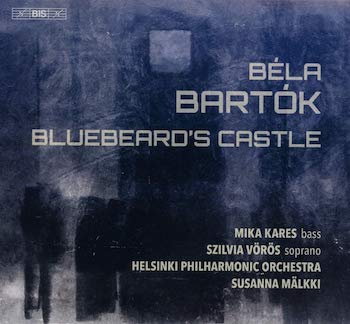Classical CD Review: A Vibrantly Harrowing “Bluebeard’s Castle”
By Jonathan Blumhofer
If this is your first Bluebeard’s Castle, Susanna Mälkki’s recording makes for a fine, occasionally inspired, introduction.

Conductor Susanna Mälkki continues her survey of Béla Bartók’s stage works with a new recording of his 1911 opera, Bluebeard’s Castle. As in her superb 2019 disc of Bartók ballets, she leads the Helsinki Philharmonic Orchestra (HPO) in the performance, which also features baritone Mika Kares and mezzo-soprano Szilvia Vörös.
Setting a libretto by Bartók’s friend, poet Béla Balász, that’s based on Charles Perrault’s Le barbe bleu, the opera follows two characters, Bluebeard and Judit, Bluebeard’s new wife. After eloping, they arrive at his gloomy castle, where Judit insists that its seven locked doors be opened, and the light let in. Behind the last are Bluebeard’s three previous wives (who had been presumed murdered); as the opera ends, Judit joins them, the doors are again closed, and Bluebeard is left alone in the darkness.
It’s a strange, harrowing piece and Bartók’s writing in it is perfectly calibrated to the grim plot: by turns grand, delicate, and chilling; always with a degree (or more) of tension either lying just beneath the surface or surging above it.
On the present recording, Mälkki has a terrific sense of how the piece should flow. Her tempos move purposefully. The opera’s individual scenes brim with character: the minor-second motive during the opening of the first door (the torture chamber) speaks chillingly. The third door (which reveals Bluebeard’s treasury of riches), with its glimmering celesta part, is radiant. So, too, the revelation of the garden (door four) and the great peroration in the fifth-door scene (which unveils Bluebeard’s lands). Throughout, the HPO plays with a mix of transparency and power that’s magnificent.

Conductor Susanna Mälkki — she has a terrific sense of how the opera should flow. Photo: Twitter.
As Bluebeard, Kares brings a rich-toned nobility to the part. His is a more sympathetic realization of the role than usual, mixing moments of warmth and beauty with tragedy. Indeed, Kares sings fervently, his pitch and diction are excellent, and the intensity of his account is true to the character.
Vörös proves a largely acceptable Judit, singing with good tone and strong projection. Regrettably, the opera’s upper-register writing brings out a distracting wobble in her voice; perhaps unsurprisingly, her fifth-door high-C wants for some presence. Otherwise, she and Kares exhibit some nice chemistry – even if the pairing doesn’t quite approach the fireworks of the classic Ludwig-Berry or Norman-Polgár pairings.
A few other factors to take into consideration: Géza Szilvay recites the often-omitted narration that starts the piece. Bis’s recorded sound is, as usual, terrific. And the marvelous British musicologist Arnold Whittall provides the insightful liner notes. If this is your first Bluebeard’s Castle, Mälkki’s makes for a fine, occasionally inspired, introduction. And, if you’ve got a one already, there’s probably enough of interest here – certainly in the orchestral performance – to warrant adding a second (or third) Bluebeard to your collection.
Jonathan Blumhofer is a composer and violist who has been active in the greater Boston area since 2004. His music has received numerous awards and been performed by various ensembles, including the American Composers Orchestra, Kiev Philharmonic, Camerata Chicago, Xanthos Ensemble, and Juventas New Music Group. Since receiving his doctorate from Boston University in 2010, Jon has taught at Clark University, Worcester Polytechnic Institute, and online for the University of Phoenix, in addition to writing music criticism for the Worcester Telegram & Gazette.
Tagged: Bela-Bartok, Bis, Helsinki Philharmonic Orchestra, Mika Kares, Susanna Mälkki
